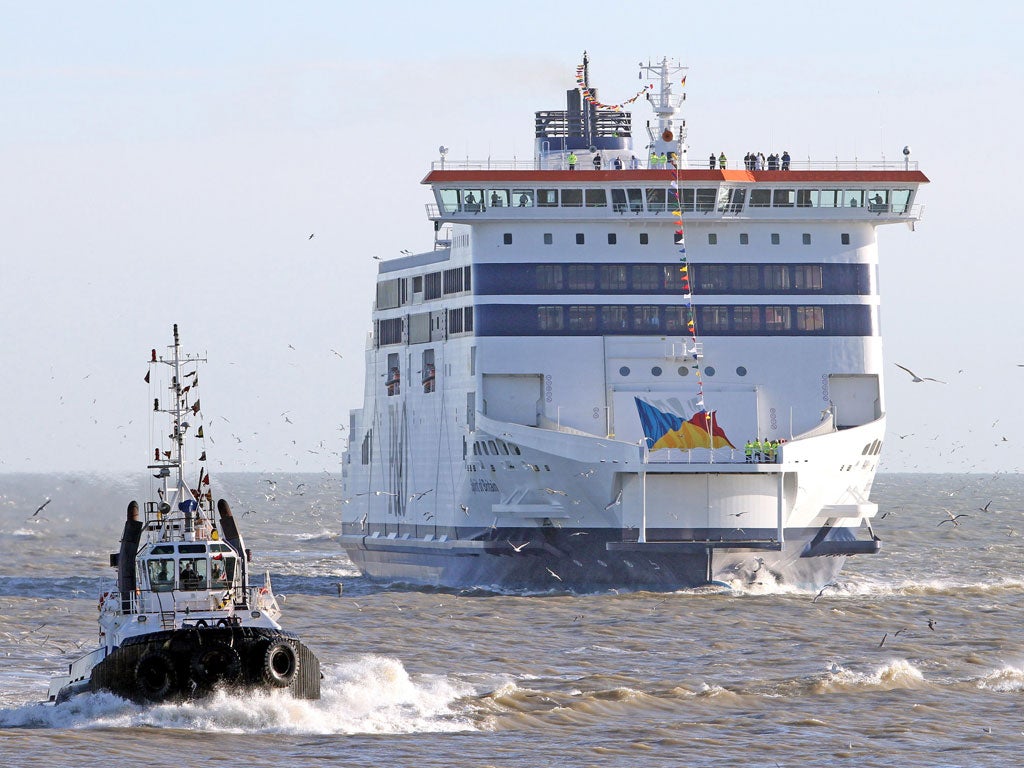Bad news for the booze cruise: New green fuel rules are set to send ferry fares soaring
Anti-pollution regulations could see an 80 per cent rise in costs and consign longer routes to history

Your support helps us to tell the story
This election is still a dead heat, according to most polls. In a fight with such wafer-thin margins, we need reporters on the ground talking to the people Trump and Harris are courting. Your support allows us to keep sending journalists to the story.
The Independent is trusted by 27 million Americans from across the entire political spectrum every month. Unlike many other quality news outlets, we choose not to lock you out of our reporting and analysis with paywalls. But quality journalism must still be paid for.
Help us keep bring these critical stories to light. Your support makes all the difference.
Fares across the Channel and the North Sea will soar if rules on cleaner fuel are tightened as planned, ferry companies are warning. When internationally agreed measures take effect in 2015, some longer routes could be axed – forcing holidaymakers and hauliers to drive much further.
Robin Wilkins, the chairman of the Association of British Travel Organisers to France, said yesterday: "We will see fewer ferries, and much higher fares." Most ships burns low-grade fuel oil, which in its untreated form typically produces emissions containing 2 or 3 per cent sulphur dioxide – the compound held responsible for "acid rain".
The limit for ships in the English Channel, the North Sea and the Baltic is 1 per cent, which is currently achieved at modest extra cost. But under "Marpol Annexe VI", part of the convention on marine pollution, this level of sulphur emissions will be outlawed after 2014. The limit will be cut to just 0.1 per cent. Regulations for waters almost everywhere else in the world are more relaxed.
The tougher rules were agreed by the International Maritime Organisation (IMO), the UN agency based in London. A spokesman said: "The IMO's vision for the industry is to eliminate, or reduce to the barest minimum, all adverse environmental impacts from ships. Marpol Annexe VI exists because we want to prevent pollution."
The trade association for the marine fuel industry is the International Bunker Industry Association. Its acting chief executive, Trevor Harrison, said: "My perception is that the regulators and politicians are viewing this in the same way that they viewed the elimination of lead from fuel in cars and the introduction of catalytic converters.
"There was speculation that it could not be done right up until the last minute, when it was successfully achieved. They might be right and it may work out, but currently everything points to 'no, it won't'."
To meet the new limit, ships are likely to switch to diesel or low-emission fuels such as liquefied natural gas. "Clean" fuel currently costs about 50 per cent more than marine fuel oil. A surge in demand is expected drive the price higher – and could even cause shortages in diesel, with shipping lines competing with motorists for scarce fuel if the oil companies are unable to step up production.
DFDS Seaways, which sails from Dover to Calais and Dunkirk and across the North Sea, predicts fuel costs will rise by 80 per cent. The firm's passenger director, John Crummie, said: "The proposed changes will directly impact the whole supply chain and ultimately increase costs to the consumer for everything from holidays to the price of food in their supermarket".
Chris Laming, director of communications for Britain's biggest ferry operator, P&O, said "Prices for the ferry-goer will have to rise across the board. That will drive thousands of HGVs to take the long way round with the unintended consequence of causing greater CO2 emissions. Where's the sense in that?"
Join our commenting forum
Join thought-provoking conversations, follow other Independent readers and see their replies
Comments